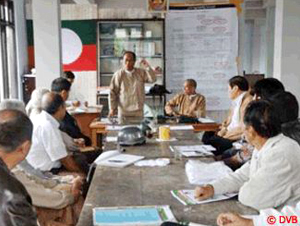The chairman of the Shan Nationalities Democratic Party has said the party will renew efforts to unify Burma’s two most prominent ethnic Shan political parties, the other being the regionally dominant Shan Nationalities League for Democracy.
“Monks and laypeople have been asking for a joining of the two Shan parties,” said Sai Ai Pao, the SNDP chairman.
“It was very effective that an influential monk told people at a prayer meeting in Hsenwi, asked them not to vote for any party unless the Shan parties became one. If people do not vote for any party, we will lose our right to convey people’s voices in Parliament. So, we decided to join.”
The state’s two main ethnic Shan political parties have had an agreement in principle to unite since 2014, but the process of merging has largely been at a standstill since that time.
Three years later, the SNDP is pushing ahead with the plan, citing the desire of the Shan people to see a unified Shan political front as the 2020 general election approaches.
Sai Hla Kyaw, vice chairman of the SNDP, told DVB on Tuesday that the party’s Central Executive Committee had agreed to merge with the SNLD and had sent a letter regarding the proposed merger to the Committee for Shan State Unity (CSSU) on 28 October.
The CSSU was formed in 2013, comprised of Shan ethnic armed groups, Shan political parties and Shan civil society organisations. The committee’s current chair is General Yawd Serk of the Restoration Council of Shan State ethnic armed group.
“I think it is time to be working together for the future. We want to continue the process of merging with the SNLD. We want to discuss that with them. We will form a new Shan political party if we are able to merge,” said Sai Hla Kyaw.
In the letter from the SNDP to the CSSU, it said that alternatively, the two parties could discuss dividing the constituencies that they contest in the 2020 election, should a merger prove unsuccessful, to increase the likelihood of Shan parties triumphing over other political parties fielding candidates in Shan State.
“We hope to merge with the SNLD within two years. But it is not easy. A lot of policy must be discussed. That’s why we need to discuss another way,” Sai Hla Kyaw said, referring to the possibility of divvying up constituencies. “Otherwise, we [Shan political parties] won’t find it easy to win all constituencies in 2020.”
In the 2015 general election, Shan political parties performed relatively poorly in eastern Shan State. What’s more, Shan parties were unable to surpass the number of seats in the Shan State legislature won by candidates from the Union Solidarity and Development Party (USDP), the military-backed, former ruling party that fared poorly across much of the rest of the country.
Sai Nyunt Lwin, general secretary of the SNLD, said his party had not yet received a letter from the SNDP detailing renewed interest in a union of the two Shan political factions, adding that any proposed merger would need to be put before the CSSU for discussion before it could move forward.
“The main obstacle is policy. We cannot say anything more,” he said.
[related]
The SNDP said its letter had received a prompt response from the CSSU chairman, who welcomed the CEC’s decision and pledged the committee’s support in helping to facilitate the merger process.
The SNDP vice chairman said the party is aware of, and would seek to avoid, the problems that have beset the Arakan National Party, which was officially registered out of the merger of two ethnic Rakhine political parties in 2014, only to see growing intra-party strife in the years since.
The SNDP, which had notable success in a 2010 general election that the SNLD boycotted, saw its incumbents largely swept away by SNLD challengers in 2015. Today, the SNDP holds just one seat in the Shan State legislature, while the SNLD boasts 46 representatives across the state legislature and the two houses of the Union Parliament.
With additional reporting by Nang Mya Nadi



